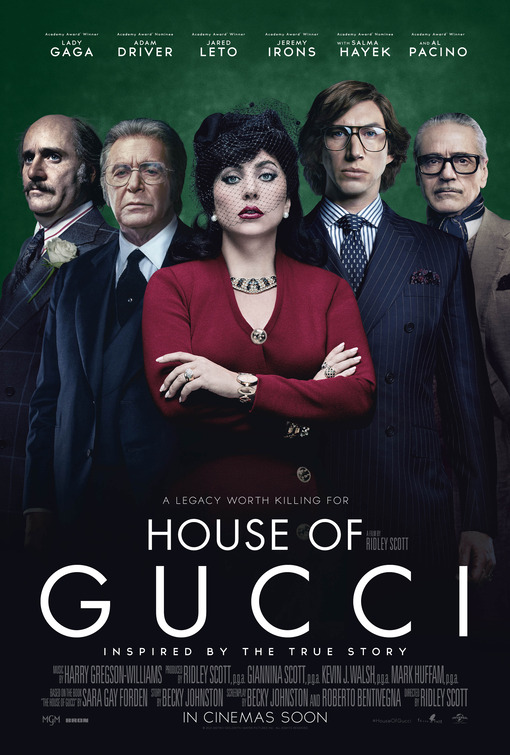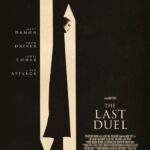A Legacy Worth Killing For.
Director
Ridley Scott
Starring
Lady Gaga
Adam Driver
Al Pacino
Jeremy Irons
Jared Leto
Salma Hayek
From their first meeting in the late 70s, the film charts the relationship of Patrizia Reggiani [Gaga] and Maurizio Gucci [Driver] all the way to the mid 90s with Maurizio’s death. With Patrizia being the daughter of a small business owner, Maurizio’s father, Rodolfo [Irons], feels Patrizia is simply sniffing around for the Gucci money and name. Taking offence, Maurizio distances himself from the family business, estranging himself from his father and working for the Reggianis. Once the couple are married and have their first child, the rift is healed and with the help of Maurizio’s uncle Aldo [Pacino] as well as Patrizia’s insistence, Maurizio starts to position himself as heir apparent to the company.
Tonally this film is remarkably choppy, unable to settle on whether it wants to be a campy black comedy or a serious chronicling of ambition and empire. As we are introduced to our two leads, there’s a coy budding romance, setting up the innocence and purity of their union in the face of parental disapproval. But even when they are positioned by destiny and appetite, the transition to betrayal never seems truly earned; we see the motions but don’t necessarily feel them.
If we are in agreement that this film exists on a semi heightened level of absurdity – that the family’s melodrama is nonsense in the face of what we would consider real strife and adversity – then Gaga understands the assignment entirely and her performance carries the film. Similarly, Adam Driver is magnificent as ever and while it’s a painful cliche to draw a parallel between any Italian family drama and The Godfather, there is a distinct Michael Corleone air to Maurizio – most notably in how he wants no part in the family business but is sucked in nevertheless and essentially becomes its worst offender.
The supporting roles entirely complicate this movie. With the old guard in the form of Irons and Pacino, we catch a glimpse of the subterfuge, manipulation and levels of self deceit that have pushed the Gucci name into the limelight. Both believing they are the sole reason the brand is successful while simultaneously relegating the fashion house to limping mediocrity. We also have a fairly minor supporting role of Giuseppina “Pina” Auriemma played by Salma Hayek. She serves not only as Patrizia’s confident but also her connection to the underworld when the time comes to assassinate Maurizio. I will say, despite being a minor novelty, around the two hour mark it seems evident that she’s authentically psychic.
And finally we have Jared Leto. No matter how many positive elements are on show in this film, no matter how well the production design or technical aspects are functioning, you cannot escape the utter absurdity of Leto’s performance. Not only is it an offensive stereotype, it’s a cartoonishly buffoonish caricature plucked from an altogether different feature. In minimal doses, I could see this clown figure working to an extent – especially as he is positioned as the talentless, useless black sheep of the family – but the more we are exposed to the over-the-top gesticulation and nails-on-chalkboard accent, it’s impossible not to hate the experience. But the truly astonishing aspect isn’t the audacity shown by Leto but the ambiguity with which his co-stars and director displayed by watching what he’s doing and saying, “Yeah, this is working.”
Going into this movie, I had such high hopes. From such a rich setup and an absolutely stacked cast, it’s frustrating to see how little fruit this enterprise bore. Patrizia’s Lady Macbeth rise to power feels a little unprompted, I get the best intentions for the one you love can become twisted but the leap to killing him is never efficiently sold to us. Similarly, Maurizio grows bored of his wife but it’s never explicitly clear how or why other than a real life rift tore them apart. I know this woman paid men to kill her husband but despite over two and a half hours, I couldn’t tell you why. The whole narrative tumbles along without sweeping you up in the dynastic drama and the editing and pacing leave much to be desired, so often dragging before rushing to the eventual conclusion.
To return to the tonal issue, nowhere is that more at odds than how this film devolves in the third act. As the film marches on, we lose all sense of fun and zeal, with the focus shifting from “look at this rich family and their silly problems” to “this is a real story about a woman who had her husband killed.” Considering Ridley Scott put out arguably one of the best films of the year in The Last Duel, it’s hard to fathom how he also made one of the most disappointing. But then, to be fair, that mercurial unpredictability and inconsistency is something of a trademark for Mr Scott.
Ultimately, it’s impossible to call this movie a complete waste of potential but certainly, despite all the opportunity, funds and connections available, it’s definitely a squandering of one.
Release Date:
26 November 2021
The Scene To Look Out For:
Of all the peaks and troughs, there were quite a few standout moments. One of the quickest descents for me took the form of an early montage detailing the high-born Maurizio bonding with his work colleagues at the Reggiani family business, to some surreptitious workplace sex with the boss’ daughter. I appreciate what the scene is trying to convey – these two are young and in love and neither one is particularly worried about status.. but holy hell that sex scene is stupid. Like, it’s laughably stupid in how it’s framed and performed.
Notable Characters:
Jack Huston gives a secondary but decent performance as Domenico De Sole, family accounts keeper and later CEO of Gucci. There’s a simplicity and external dispassion to his presence that serves as a palate cleansing parallel to the wide-eyed scheming and ingratiation of Patrizia. Like watching the hard-working vizier eventually given the crown as the family machinations leave him the only one standing.
Highlighted Quote:
“Gucci is like that cake, you think there’s enough to go around and then you have a taste and then you want more and then you want the whole thing for yourself.”
In A Few Words:
“A cleft feature at odds with itself, never truly able to reconcile its intentions or execution.”
Total Score: 2/5

![The Red Right Hand Movie Reviews [Matthew Stogdon]](https://reviews.theredrighthand.co.uk/wp-content/uploads/2021/12/cropped-header1.png)



